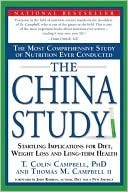Consuming diets high in protein and fat transfers calories away from their conversion into body heat to their storage form—as body fat (unless severe calorie restriction is causing weight loss). In contrast, diets low in protein and fat cause calories to be “lost” as body heat. In research, we say that storing more calories as fat and losing less as heat means being more efficient. I bet that you would rather be a little more inefficient and convert it into body heat rather than body fat, right? Well, simply consuming a diet lower in fat and protein can do this. This is what our China Study
Consuming diets high in protein and fat transfers calories away from their conversion into body heat to their storage form—as body fat (unless severe calorie restriction is causing weight loss). In contrast, diets low in protein and fat cause calories to be “lost” as body heat. In research, we say that storing more calories as fat and losing less as heat means being more efficient. I bet that you would rather be a little more inefficient and convert it into body heat rather than body fat, right? Well, simply consuming a diet lower in fat and protein can do this. This is what our China Study data show. Chinese consume more calories both because they are more physically active and because their consumption of low-fat, low-protein diets shifts conversion of these calories away from body fat to body heat. This is true even for the least physically active Chinese. Remember, it takes very little, only fifty calories a day, to change our storage of body fat and thus change our body weight.58 We saw the same phenomenon in our experimental animals fed the low-protein diets. They routinely consumed slightly more calories, gained less weight, disposed of the extra calories as body heat59 and voluntarily exercised more,60 while still having far less cancer than animals on standard diets. We found that calories were “burned” at a faster rate and transformed into body heat as more oxygen was consumed.59 Understanding that diet can cause small shifts in calorie metabolism that lead to bi...
...more
This highlight has been truncated due to consecutive passage length restrictions.


